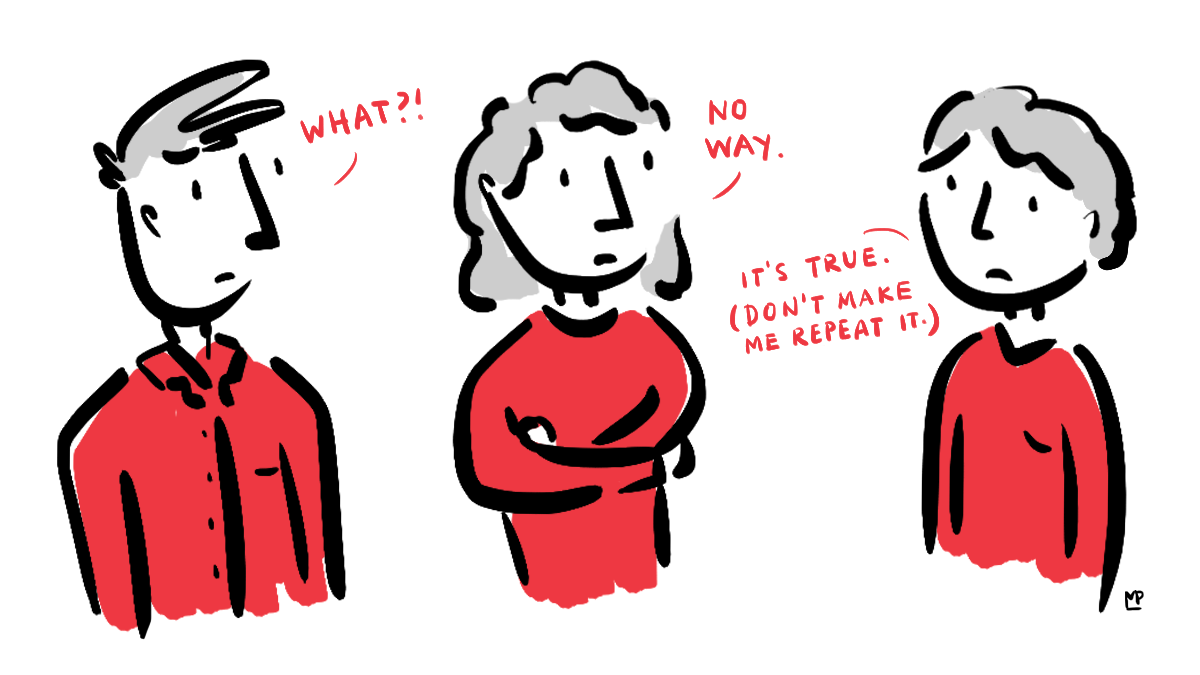What not to say:
“You’re joking, right?”
Chances are pretty slim that anyone finds it funny to joke about losing their job. If you are shocked, say so. But don’t inadvertently discount their truth and the gravity of their situation.
“You’re taking one for the team.”
Unless the person voluntarily resigned, specifically for the welfare of the team, they did not choose to “take one for the team.” More likely, it is an undesired loss, not a heroic act of selflessness.
“Be grateful. At least you _____________.”
There’s no kind way for this sentence to end. Sure, maybe you have three kids in college or care for a chronically ill parent. Sure, maybe they get a few weeks’ severance pay. But your pointing out what they do or don’t have to do deal with doesn’t help. Don’t try to downplay the bad news of others, get competitive with bad news, or recast their bad news in a “you-oughta-be-grateful” light.
“You’re so amazing, I’m sure you’ll get a job right away!”
This is only going to make someone feel worse if they don’t find something right away. And, let’s be real, not everyone gets hired right away, no matter how good they are in their career.
“Hey, it’s a good opportunity to make a career shift.”
Not everyone wants to pivot. The person could have more dreams and goals they want to pursue in their current career. They could be so specialized they can’t easily pivot. And even if they do want to pivot, they may be starting from ground zero…it’ll be a lot of hard work ahead.
“Well, you won’t have to hang around with us in a germy office!”
Nope, but now they might be thinking of how they’ll be sitting by themselves at their kitchen table, submitting resume after resume. And they might think of all the fun team activities they won’t get to do again.
“I guess they cut the ________ ones first.”
Don’t even go here. Don’t put a label on someone as their reason for being laid off. Don’t speculate.
*nothing*
It’s hard to know what to say. But saying nothing can easily sound like you don’t care, or that you’re silently delighting in their loss.
Consider saying:
“I’m sorry to hear this. I don’t know what to say.”
It’s ok to admit it if you’re at a loss for words. Acknowledging that the news is unfortunate is much better than saying nothing at all.
“I believe in you. You are extremely capable and have many strengths.”
Lay-offs can shatter confidence. If there’s something you respect and admire something about this person, tell them. They might brush it off in the moment, but it could be the thing that will help them bounce back.
“Whoever gets to work with you next will be very lucky.”
Show that you see the person as a long-term success, and that good news is somewhere ahead. Reflect that your vision of their future is optimistic.
“This is a loss for the company.”
People want to feel wanted. It is comforting to hear that your absence is a loss. And it is objectively true: a lay-off is a loss of an employee. Each person does add something special to a company. You don’t have to judge or clarify what kind of loss.
“If there’s something I can do to help, let me know.”
And let them reach out to you, rather than pester them (with your good intentions) for the latest update on their job search. Also, only say this if you mean it. Don’t make an empty promise at a time when someone has already felt let down and betrayed by their company.
“If you ever want to grab coffee sometime, I’m in.”
Being cut off from the team can feel painful. If it feels right in your relationship with this person, reach out with a friendly offer to stay connected. Even if they choose not to accept at the moment, they will feel that extension of compassion. And it matters.


